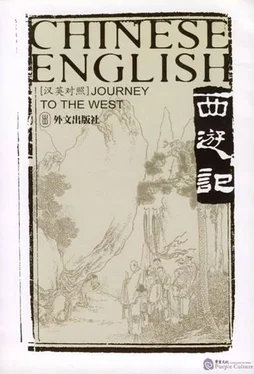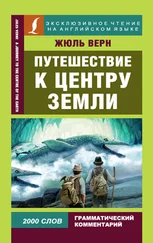To this the Eighteenth Lord replied with a smile, “We have long heard, holy monk, of how you have found the Way and we've long been waiting for the good fortune of meeting you that we have enjoyed today. I hope that you will not be grudge the pearls of your wisdom, but will make yourself comfortable, sit and talk. Then we may learn about the true Dhyana teachings.”
“May I ask the titles of the immortals?” Sanzang asked with a bow.
“The one with white hair,” the Eighteenth Lord replied, “is known as the Lone Upright Lord; the one with green temples is Master Emptiness; and the one with a pure heart is the Ancient Cloud-toucher. My title is Energy.”
“How old are you four venerable gentlemen?” Sanzang asked. To this the Lone Upright Lord replied,
“I am already a thousand years old;
I touch the sky and my leaves are always spring.
Elegant are my fragrant branches
Shaped like dragons and snakes;
My shadow is broken into many parts;
My body is covered in snow.
Since childhood I have stood firm and endured;
Now I am happy to cultivate the True.
The birds and phoenixes that perch are not mere mortal ones;
I am free and far from the dust of the normal world.”
Master Emptiness spoke next with a smile:
“I've borne wind and frost for a thousand years,
Strong in my tall body and the vigor of my limbs.
In the still of the night comes the sound of raindrops,
And the shade spreads like a cloud in autumn sunlight.
My gnarled roots have the secret of eternal life;
I have been given the art of never aging.
Storks stay here and dragons, not common creatures:
I am green and full of life, as in immortals' land.”
Then the Ancient Cloud-toucher said with a smile,
“Over a thousand autumns have I passed in emptiness;
Lofty is the view that grows ever purer.
Here there is no commotion, but eternal cool and calm;
I am full of spirit and have seen much frost and snow.
The seven worthies come to talk about the Way;
I sing and drink with my friends, the six men of leisure.
Lightly beating the jade and the gold
My nature is one with heaven; I roam with immortals.”
Then Energy, the Eighteenth Lord, smiled as he said,
“My age is also over a thousand,
I am hoary, pure and natural.
Rain and dew give admirable vigor;
I borrow the creative power of heaven and earth.
Alone I flourish in ravines of wind and mist,
Relaxed and at my ease through all four seasons.
Under my green shade immortals stay
For chess and music and books on the Way.”
“All four of you immortals have lived to most advanced ages.” Sanzang said, “and the old gentleman Energy is over a thousand. You are ancient, you have found the Way, you are elegant and you are pure. Are you not the Four Brilliant Ones of Han times?”
“You flatter us too much,” said the four old men. “We're not the Four Brilliant Ones: we're the four from deep in the mountains. May we ask, worthy monk, what your illustrious age is?” Sanzang put his hands together and replied,
“Forty years ago I left my mother's womb,
Fated to disaster since before my birth.
Escaping with my life I floated in the waves
Until I reached Jinshan where I renewed my body.
I nourished my nature and studied the sutras,
Sincere in worship of the Buddha, not wasting time.
Now that His Majesty has sent me to the West,
I am deeply honoured by you ancient immortals.”
The four ancients then praised him, saying, “Holy monk, you have followed the Buddha's teaching since you left your mother's womb. By cultivating your conduct from childhood you have become a lofty monk who has found the Way. We are very happy to see you and would like to ask you to teach us. Could you possibly tell us the rudiments of the Dhyana dharma? It would be a great comfort to us.” When the venerable elder heard this he was not at all alarmed, and this is what he said to them:
“Dhyana is silence; the dharma is that which saves. Silent salvation can only come through enlightenment. Enlightenment is washing the mind and cleansing it of care, casting off the vulgar and leaving worldly dust. Human life is hard to obtain; it is hard to be born in the central lands; and the true dharma is hard to find. There is no greater good fortune than to have all three. The wonderful Way of perfect virtue is subtle and imperceptible. Only with it can the six sense-organs and the six forms of consciousness be swept away. Wisdom is this: there is no death and no life, no excess and no deficiency, emptiness and matter are all included, holy and secular both dismissed. It has mastered the tools of the Taoist faith and is aware of the methods of Sakyamuni. It casts the net of phenomena and smashes nirvana. Perception within perception is needed, enlightenment within enlightenment, then a dot of sacred light will protect everything. Light the raging fire to illuminate the Saha realm; it alone is revealed throughout the dharma world. Being utterly subtle it is firmer than ever: who crosses the pass of mystery through verbal persuasion? From the beginning I cultivated the Dhyana of great awareness: I was fated and determined to attain enlightenment.”
The four elders listened with cocked ears and were filled with boundless joy. Each of them kowtowed and was converted to the truth, saying with bows of gratitude, “Holy monk, you are the very root of the enlightenment to be found through Dhyana meditation.”
The Ancient Cloud-toucher said, “Dhyana may be silence, and the dharma may well save, but it is necessary for the nature to be settled and the mind sincere. If one is a true immortal of great awareness one has to sit in the Way of no-life. Our mysteries are very different.”
“The Way is not fixed; its form and function are one. How is yours different?” Sanzang asked. To this the Ancient Cloud-toucher replied with a smile:
“We have been firm from birth: our forms and functions are different from yours. We were born in response to heaven and earth and grew through the rain and the dew. Proudly we laugh at wind and frost; we wear out the days and nights. Not one leaf withers, and all our branches are full of firm resolve. What I say has no emptiness about it, but you cling to your Sanskrit. The Way was China's in the first place and only later looked for more evidence in the West. You are wearing out your straw sandals for nothing: you don't know what you are looking for. You are like a stone lion cutting out its own heart, or a fox salivating so hard it digests the marrow of its own bones. If in your meditation you forget your roots you will pursue the Buddha's reward in vain. Your words are as tangled as the brambles on our Thorn Ridge and as confused as the creepers. How can we accept a gentleman such as you? How can one like you be approved and taught? You must reexamine your present state and find a life of freedom in stillness. Only then can you learn to raise water in a bottomless basket, and make the rootless iron-tree flower. On the peak of the Miraculous Treasure my feet stand firm; I return to the assembly at Longhua.
When Sanzang heard this he kowtowed in thanks, and the Eighteenth Lord and the Lone Upright Lord helped him back to his feet, Master Emptiness said with a chuckle, “Cloud-toucher's remarks revealed things a little too clearly. Please get up, holy monk: you don't have to believe every word of it. We didn't intend to use the light of the moon for serious discussions. We should chant poems, feel free, and let ourselves relax.”
“If we're going to recite poems,” said Cloud-toucher with a smile, pointing towards the stone house, “why don't we go into the hermitage and drink some tea?”
Sanzang answered with a bow and went over to look at the hermitage, above which was written in large letters TREE IMMORTALS' HERMITAGE. They all then went inside and decided where to sit, whereupon the red devil servant appeared with a tray of China-root cakes and five bowls of fragrant tea. The four old men urged Sanzang to eat some cakes, but he was too suspicious to do so, and would not take any till the four old men had all eaten some: only then did he eat a couple. After they had drunk some tea it was cleared away. Sanzang then stole a careful look around and saw that everything was of a delicate and intricate beauty in the moonlight:
Читать дальше









